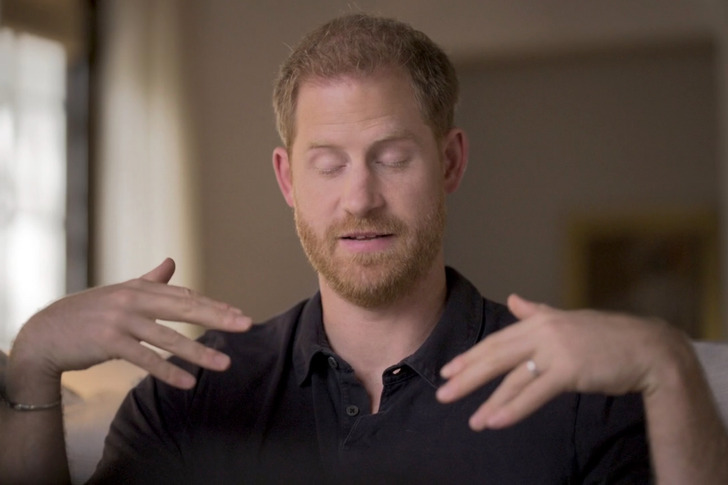Prince Harry recently opened up about his journey with post-traumatic stress disorder following the loss of his mother, Princess Diana. In a candid discussion, he revealed his exploration of a groundbreaking therapy that helped him.

The therapy is called eye movement desensitization and reprocessing (EMDR) to address the debilitating effects of his anxiety attacks. This revelation offers a glimpse into the royal’s personal struggles and his proactive approach towards mental health care, shedding light on the significance of seeking innovative treatments of traumas.
In a video, Prince Harry can be seen undergoing EMDR therapy, where he taps his shoulders and moves his eyes rapidly. This therapy is relatively new and is used to treat PTSD. Prince Harry shared that he decided to try EMDR to deal with severe anxiety attacks he was experiencing.
Prince Harry mentioned that he was open to trying EMDR because of the therapy and work he had done over the years.

During a therapy session with UK-based psychotherapist Sanja Oakley, Prince Harry demonstrated how EMDR helped him feel better about returning home. He described feeling scared and helpless before, but the therapy helped him cope with those feelings.
Prince Harry’s openness about his experience with EMDR therapy sheds light on alternative treatments for post-traumatic disorder and mental health struggles. It shows that seeking help and trying different therapies can make a difference in managing mental health conditions.

EMDR is a therapy made in 1987 to help with emotional traumas. It’s a structured therapy where you think about a tough memory while moving your eyes back and forth. This helps lessen the strong feelings tied to the memory.
EMDR works on a theory called Adaptive Information Processing (AIP). It says that trauma sticks around because it hasn’t been dealt with properly. So, when something reminds you of the trauma, those memories can come back strongly.
Unlike other therapies that try to lessen your reaction to trauma, EMDR tries to change how your brain stores those tough memories. Sometimes, instead of eye movements, you might listen to alternating tones. Usually, EMDR happens once or twice a week for about six to 12 sessions. But it can vary depending on the person.
Benefits of EMDR therapy
- EMDR is a structured therapy and usually needs fewer sessions than ongoing therapies.
- You don’t have to keep going back to the tough memory for a long time.
- You don’t have to talk a lot about what happened to you.
- There’s no homework to do.
- EMDR doesn’t try to change your thoughts and beliefs.
Disadvantages of EMDR therapy
- While EMDR is known to help with PTSD, it hasn’t been studied as much for other mood or mental health problems.
- If you’re avoiding talking about a tough event, EMDR might not be the best choice. Other types of talk therapy might work better.
- EMDR can sometimes make you feel worse at the start of treatment. The person who created EMDR warns that this could be dangerous for people who have gone through really tough things.
The process of EMDR
EMDR is a structured process with eight phases, each aimed at helping you deal with traumatic memories:
- History taking: Discuss your past with the therapist to identify which memories to focus on.
- Preparation: Learn about EMDR and how the therapist will use bilateral stimulation.
- Assessment: Identify your negative and positive beliefs related to the trauma.
- Desensitization: Use bilateral stimulation while recalling the memory.
- Installation: Focus on positive beliefs while processing the memory.
- Body scan: Talk about how you feel emotionally and physically.
- Closure: Prepare for what may happen between sessions.
- Reevaluation: Assess your progress and decide if more sessions are needed.
As you go through EMDR, you may start feeling less overwhelmed by the trauma. It’s normal for other painful memories to surface, indicating that suppressed memories are being processed.
When grappling with deep emotional traumas, it’s crucial to seek out specialists who can provide the appropriate form of treatment tailored to your needs. Whether it’s EMDR therapy or other therapeutic approaches, finding the right professional can make a significant difference in your healing journey.
Preview photo credit Good Morning America / YouTube
I Told My Friend She Married a Useless Man, and Now She Hates Me

I take it that everyone of us must navigate our own lives and take responsibility for our decisions? However, it is in our nature as humans to want to help friends who are actually in need. However, what would you do if your friend—the one you always stand by—started confiding in you about all of their issues, repeatedly, and with no sign of stopping? This Reddit member is exactly in that predicament. She wondered if she was managing the matter with her buddy correctly, so she looked to the large internet community for advice.

I(32F) am a single mother of two kids (6M and 5m F). I am a single mother by choice (my kids are donor conceived).
I am lucky enough to have a good job (French teacher in a private school), and a paid off house (parents’ life insurance and inheritance).
Before I had either of my kids, I made sure to have a year’s living expenses saved, then I would take a sabbatical to recover from birth, as well as bond with my kids. While on sabbatical, I still tutor some kids for some extra income.
My friend (34F), just had a baby 2 months ago. She is the breadwinner in her household, and her husband has been unemployed since he was laid off during COVID.
It was great to be pregnant at the same time, as well as having a friend with a newborn. But it has turned sour.
She has been saying how jealous she is of me being able to take off a whole year from work, how she would have loved to not worry about losing their home, how she doesn’t even have a couple hundred dollars in her savings account, let alone a whole year’s worth of living expenses….
I usually ignore it, or brush it off, because I kind of can understand the stress she is under.
Well, starting about 10 days ago, she started hinting at not being able to afford daycare, and any mention of her husband taking care of their kid is brushed off. Then she started remarking on how much free time I must have, which I deflected by saying -truthfully- that being a single mom to a baby and a small kid left me no free time actually.
Then last night she came out with it, and asked if I could “do her a favor” and watch her kid while she’s at work. I was firm, but polite, when I said that I couldn’t, that I am not capable of watching two kids under 6 months.
She started almost begging me, saying she can’t afford daycare, and if she is not back at work, she will lose her job, and they will end up homeless. I again brought up her husband, and she said that he was not good with kids, and isn’t capable of taking care of her kid.
I kept saying no, she kept pushing, until it escalated to her calling me heartless, and me telling her that it’s not my problem she chose to have a kid with a useless man.
Now she blocked me, I am feeling very guilty about what I said, and feeling like an AH.



Leave a Reply